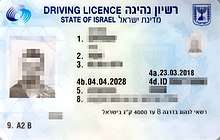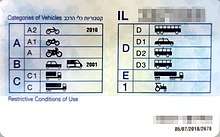Driving licence in Israel
Driving licences in Israel come in twelve types, similar to the European driving licence (although small differences exist). In order to receive a licence, each applicant must pass a medical and eye checkup, and a theoretical test, before taking a number of practical lessons culminating in the practical test.


Types of licence
Israel has the following types of driving licences:
- A2, A1 and A licences – for two-wheeled vehicles, with horse power limits set at:
A2 - 14.6 HP, A1 - 47.46 HP, A - no limit
- B – for passenger vehicles up to 3.5 tons and up to 8 passengers (not including driver)
- C1, C – trucks,
C1 for private minibus up to 8 passengers. C – for trucks up to 12 tons and no tonnage limit
- D3, D2, D1, D – for large passenger vehicles.
D3 for a private minibus up to 5 tons, D2 for a public minibus with the same tonnage limit, D1 for a public transport vehicle with up to 16 passengers, and D for buses.
- C+E – for commercial motor vehicles, up to 3.5 tons (including attachments)
- 1 – for tractors (not included in EU standards)
Passenger car licence
Anyone aged at least 16 years and 9 months may receive a Type B driver's licence. After receiving both a medical and eye checkup, an applicant can take a 30 question multiple-choice test, of which they must answer at least 26 correctly. Before taking the actual driving test, they must receive at least 28 lessons at a certified driving school. After passing the internal driving school test, the instructor will arrange the road test, which will be taken in the driving school's vehicle. If someone fails either the written or driving test, one must wait one day before retaking the written test, however the current wait time is to take a second driving test is uncertain, ranging between three and six months. Once the driving test has been passed, the licensing authority will issue a temporary licence together with a payment voucher. Once the fee has been paid, the actual licence will be sent in the mail.
For the first three months, the new licensee must be accompanied by someone aged over 24, who has had a licence for at least 5 years, or someone over 30, who has had a licence for over 3 years. For the next three months the new driver must also be accompanied as before from at night, specifically from 9 P.M. until 6 A.M. In addition, for the first two years, the new driver must display a sign reading "New Driver" (Hebrew: נהג חדש, Nahag Hadash) in black letters on a yellow background. Anyone failing to comply with these requirements is subject to be fined and tried in traffic court for driving without a licence. If a new driver violates a traffic law, one may be required to retake the written and driving test.
Foreign driving licence
New immigrants, tourists, temporary residents, and citizens returning after residing overseas for at least a year may drive in Israel on a foreign licence for one year from entry into Israel.[1]
Licence conversion
Anyone possessing a foreign driving licence residing in Israel for more than 12 months must convert their driving licence. As of August 13, 2017, any immigrant that held a driving licence 5 years prior to his/her immigration can convert his/her licence Without taking any tests The applicant is required to undergo both a medical checkup and eye checkup. After applying at the local licence authority office for an exemption from the written test and the requirement for 28 lessons, one is required to pay for a test at the local post office, and the instructor will arrange for an abbreviated driving test. Prior to May 13, 2014 if the applicant failed two such tests, he or she had to pass the written test before retaking a thorough driving test. Legislation passed by the Knesset on that date, however, allows a licensed foreign driver to re-take the test indefinitely within the first three years following aliyah.